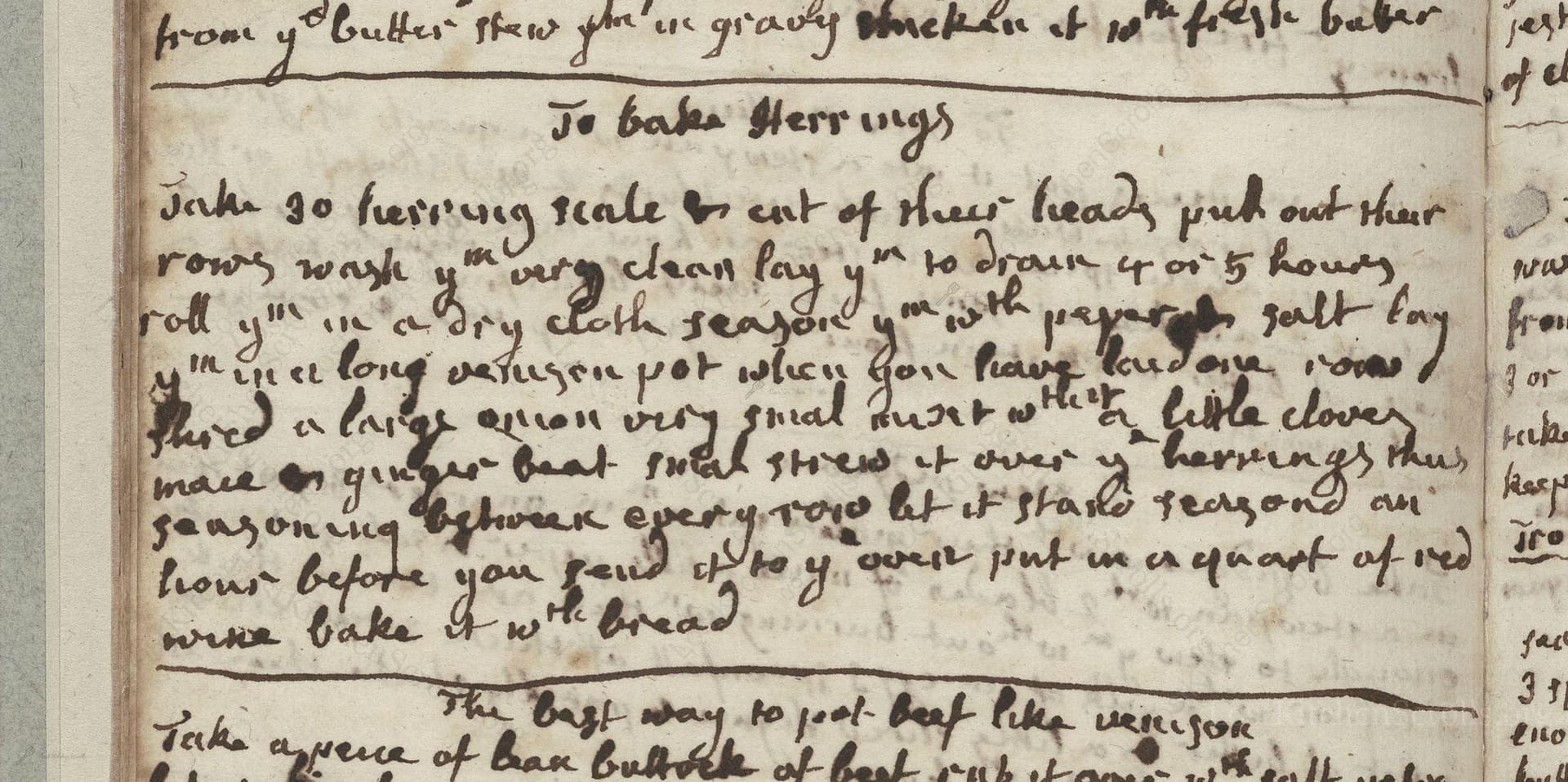To Bake Herrings
From the treasured pages of Mrs. Knight's receipt book
Written by Mrs. Knight

To Bake Herrings
"Take 30 herring scale & cut of their heads put out their rows wash ym very clean lay ym to drain 4 or 5 hours. roll ym in a dry cloth season ym in it long with peper salt & a little clover. put in a large onion very smal cutt mace & ginger beat smal strew it seasoning between every row let it stand 4 or 5 hours before you send it to ye oven bake it wth bread"
Note on the Original Text
The original recipe uses period spelling ('clover' for clove, 'ym' for 'them', 'ye' for 'the') and makes liberal use of abbreviations and run-on sentences common in the 18th century. Quantities are rarely precise, with instructions based on practice and intuition. The writing is practical, assuming a cook familiar with the necessary steps—the recipe is more a memory aid than a full manual. Words like 'season ym in it long' reflect the old use of 'in it' for mixing spices in a cloth with the fish.

Title
Mrs. Knight's receipt book (1740)
You can also click the book image above to peruse the original tome
Writer
Mrs. Knight
Era
1740
Publisher
Unknown
Background
Step into the refined kitchens of 18th-century England with Mrs. Knight’s culinary collection, where time-honored recipes, hearty roasts, and elegant pastries await the enterprising cook.
Kindly made available by
Folger Shakespeare Library
This recipe comes from the kitchen of Mrs. Knight, who flourished around 1740, in a prosperous mid-18th-century British household. Pickling and baking herrings was not only a way to enjoy this abundant fish but also to preserve it slightly, extending its shelf life. Coastal communities and even inland gentry prized such preparations, especially in the winter months when fresh meat was scarce. Recipes like this offer a glimpse into the homey, resourceful cooking traditions and the growing influence of spices from overseas trade.

The recipe would have relied on the use of a sharp kitchen knife for scaling and gutting the herrings, wooden or ceramic bowls for seasoning, a clean linen cloth for drying the fish, and a deep ceramic or cast iron baking vessel. The baking would be done in a wood-fired or coal oven, likely at the same time bread was being baked to make use of the hot oven.
Prep Time
9 hrs
Cook Time
35 mins
Servings
10
We've done our best to adapt this historical recipe for modern kitchens, but some details may still need refinement. We warmly welcome feedback from fellow cooks and culinary historians — your insights support the entire community!
Ingredients
- 30 whole fresh herrings (approx. 6.5–7.5 lb)
- Sea salt, to taste (about 2–3 tbsp)
- Black pepper, freshly ground, to taste (2–3 tsp)
- Ground clove (or substitute with allspice), 1/2 tsp
- 1 large onion (about 5 oz), finely chopped
- Ground mace (or substitute with nutmeg), 1 tsp
- Ground ginger, 1 tsp
Instructions
- Begin by taking 30 herrings, about 6.5–7.5 lb in total.
- Remove the scales and cut off the heads.
- Open the fish and carefully remove the roe if present, washing all parts thoroughly.
- Drain the cleaned herrings for 4 to 5 hours, preferably over a sieve or in a colander.
- Pat the herrings dry with a clean tea towel or paper towels.
- Season the fish by rolling them in a mixture of ground black pepper, sea salt, and a little ground clove.
- Sprinkle finely chopped onion (about 1 large onion, ~5 oz), along with a bit of ground mace and ground ginger between layers of fish in a deep ovenproof dish or casserole.
- Let the seasoned herrings sit like this for 4–5 hours at cool room temperature to allow the flavours to meld.
- Bake in a preheated oven at around 350°F for approximately 30–40 minutes, alongside (or at the same time as) your bread, until the fish are cooked through and aromatic.
Estimated Calories
290 per serving
Cooking Estimates
Preparing the fish, including cleaning, draining, seasoning, and letting the flavors meld, takes most of the time. Actual cooking happens in the oven and takes about 30–40 minutes. Each serving is estimated to have about 290 calories, and the recipe makes 10 portions.
As noted above, we have made our best effort to translate and adapt this historical recipe for modern kitchens, taking into account ingredients nowadays, cooking techniques, measurements, and so on. However, historical recipes often contain assumptions that require interpretation.
We'd love for anyone to help improve these adaptations. Community contributions are highly welcome. If you have suggestions, corrections, or cooking tips based on your experience with this recipe, please share them below.
Join the Discussion
Rate This Recipe
Dietary Preference
Main Ingredients
Culinary Technique
Occasions

Den Bockfisch In Einer Fleisch Suppen Zu Kochen
This recipe hails from a German manuscript cookbook compiled in 1696, a time whe...

Die Grieß Nudlen Zumachen
This recipe comes from a rather mysterious manuscript cookbook, penned anonymous...

Ein Boudain
This recipe comes from an anonymous German-language manuscript cookbook from 169...

Ein Gesaltzen Citroni
This recipe, dating from 1696, comes from an extensive anonymous German cookbook...
Browse our complete collection of time-honored recipes



